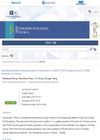TLDR AMH is a good marker for diagnosing PCOS, but global standards are needed.
The study investigated the effectiveness of serum anti-Müllerian hormone (AMH) levels and ultrasound criteria in diagnosing polycystic ovary syndrome (PCOS) among 55 women with PCOS and 63 control women. It found that AMH levels, follicle number per ovary (FNPO), and ovarian volume (OV) were significantly higher in the PCOS group. An AMH level of 4.7 ng/mL was identified as the optimal threshold for PCOS diagnosis, with a sensitivity of 80% and specificity of 77.8%. The study also suggested new thresholds for FNPO (≥15 follicles), follicle number per cross-section (≥7 follicles), and OV (≥6.5 mL) as reliable indicators of PCOS. A strong correlation was observed between AMH and FNPO in PCOS patients. The study concluded that AMH is a good marker for diagnosing PCOS, but international standards for AMH thresholds should be established. Limitations included a significant age difference between the groups and a sample from only one clinic, indicating the need for further research to validate these findings across diverse populations.
 6 citations
,
October 2014 in “Endokrynologia Polska”
6 citations
,
October 2014 in “Endokrynologia Polska” Excessive hair growth is much more common in Chinese women with PCOS than in the general population.
 221 citations
,
January 2014 in “Human Reproduction”
221 citations
,
January 2014 in “Human Reproduction” Adding anti-Müllerian hormone to PCOS criteria lowers the number of women diagnosed.
 37 citations
,
August 2012 in “European Journal of Obstetrics & Gynecology and Reproductive Biology”
37 citations
,
August 2012 in “European Journal of Obstetrics & Gynecology and Reproductive Biology” A simplified scoring system can effectively diagnose hirsutism in Chinese women of reproductive age.
 98 citations
,
July 2011 in “Fertility and Sterility”
98 citations
,
July 2011 in “Fertility and Sterility” An mFG score of 5 or more indicates above-normal hair growth in Southern Chinese women.
 989 citations
,
August 2007 in “The Lancet”
989 citations
,
August 2007 in “The Lancet” PCOS is a complex condition with major health impacts, needing more research for better diagnosis and treatment.
 4025 citations
,
December 2003 in “Human Reproduction”
4025 citations
,
December 2003 in “Human Reproduction” The 2003 consensus updated PCOS diagnosis criteria and linked PCOS to higher risks of diabetes and heart problems, recommending lifestyle changes to lower these risks.
 467 citations
,
October 2014 in “European Journal of Endocrinology”
467 citations
,
October 2014 in “European Journal of Endocrinology” The European Society of Endocrinology advises individualized long-term management for PCOS, focusing on lifestyle changes, accurate diagnosis, and treatments for associated health risks and symptoms.
 16 citations
,
September 2018 in “Clinical Biochemistry”
16 citations
,
September 2018 in “Clinical Biochemistry” The document concludes that more research is needed to fully understand the causes of PCOS.
 6 citations
,
August 2023 in “Fertility and Sterility”
6 citations
,
August 2023 in “Fertility and Sterility” The 2023 guideline for PCOS suggests using updated diagnostic criteria, assessing related health risks, and recommends lifestyle changes and specific treatments for symptoms and fertility issues.
 January 2025 in “The Journal of Clinical Endocrinology & Metabolism”
January 2025 in “The Journal of Clinical Endocrinology & Metabolism” Diagnosing PCOS is challenging due to its complex and varied symptoms.
 3 citations
,
February 2018 in “InTech eBooks”
3 citations
,
February 2018 in “InTech eBooks” Traditional Chinese Medicine and acupuncture may improve Polycystic Ovarian Syndrome symptoms and reduce costs, but more research is needed.











